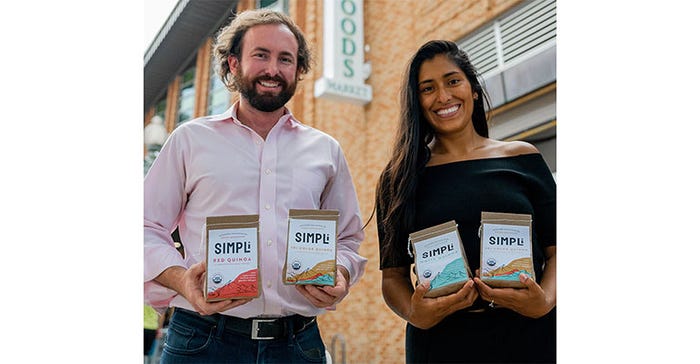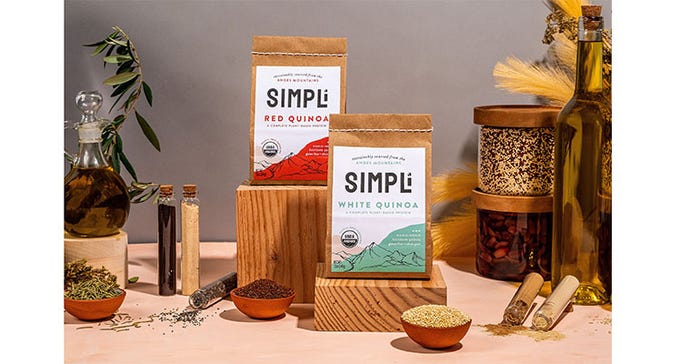SIMPLi, a supply chain disrupter, breaks new ground with ROCSIMPLi, a supply chain disrupter, breaks new ground with ROC
SIMPLi, the first South American ingredients company to earn Regenerative Organic Certification, is creating a supply chain that supports farmers.
February 17, 2022

SIMPLi co-founder Sarela Herrada remembers growing up just outside of Lima, Peru, with a chicken coop in her backyard.
"My mom is very proud of the formula she created for bird feeding," Herrada says. "She'd buy all these grains and created the most effective and organic way to feed the chickens."
At the age of 14, Herrada moved to the United States. But the organic way of life and having locally sourced food stuck with her.
"I became really interested in food and the supply chain when we moved to the U.S. because of what was available to shop for as an immigrant on a tight budget," says Herrada, who previously worked as the director of food and beverage and supply chain manager for CAVA, a Mediterranean fast-casual restaurant chain.
In 2020, Herrada and co-founder Matt Cohen launched SIMPLi, a Baltimore, Maryland-based food company focused on sourcing single-origin ingredients while building a 100% traceable international supply chain. Working directly with farmers, they hope to reduce extreme poverty and inequities in the marketplace and improve the integrity of supply chains.
"So much fraudulent food activity happens in the international supply chain," Herrada says. "It's about ethical food sourcing for a better world."
With a traditional international supply chain, farmers typically sell to a local broker co-op who resells it to a processor, who resells to an exporter who goes to an importer who sells to a U.S. broker who goes to a distributor to get it into a retail business. To reduce the "middle man" aspects which can reduce income and create inequities for farmers, SIMPLi sells directly to consumers and retailers.
That's helped SIMPLi to become the first South American company to earn Regenerative Organic Certification for grains and beans, specifically the brand's quinoa and lupini beans, Herrada says.
"It's been great distinction for us, to live through our values by helping reverse climate change and improve the lives of farmers," Herrada says. "We're excited to be at the forefront and a defining voice of what it means to be in regenerative agriculture."
In two years, SIMPLi has grown to work with more than 1,200 farmers across several continents and helped 300 farmers to earn Regenerative Organic Certification. SIMPLi spends approximately $12,000, per farming cooperative, to help them make the ROC transition, Herrada says.
That's helped farming communities in rural regions like Peru, increase profitability by 10% within the past year, Herrada says.
Last year, SIMPLi received investments after a seed round of funding led by the Abell Foundation with investments from others like Seth Goldman, co-founder of Eat the Change and Honest Tea.
SIMPLi sells its products, which include olive oil, amaranth and even stuffed Peruvian llamas toys directly to consumers via its website, as well as through Whole Foods, Amazon, Patagonia Provisions and Hive Market. It has products in over 500 restaurants—a number it aims to double this year, Herrada says.

You launched SIMPLi just as COVID-19 was beginning to hit in January 2020. How did you adjust?
Sarela Herrada: We started as a foodservice, sustainable ingredients company. We had containers of our product and a few national accounts to help us launch. And then the industry shut down.
All that inventory stayed in our warehouse, so we had to expand and adapt quickly. One of the strengths of small emerging companies is the ability to expand quickly, pivot and think of different strategies. Retail was part of what we wanted to do in the long term, but in year three, not like we did. We launched retail very quickly. COVID for us has given us the opportunity to prove that our vertical intermittent supply chain model works and expand quickly into different areas that we didn't think we were going to expand into.
That's a big pivot. How did you get into major retailers?
SH: We talked about how great our product is, that our quinoa is super fluffy, has no bitterness and cooks really well, very easily. It's different because it's sourced from the Andes, where it's grown for thousands of years. It's as natural as it gets because the irrigation comes from natural rains. Then it goes into the dry season and it's harvested. The product itself is really good because it is grown in its natural biodiversity and habitat so it contains all the properties that makes quinoa a superfood.
Being able to bring that to the customers and retailers like Whole Foods and Patagonia Provisions with the understanding that our mission was to focus on regenerative agriculture made it a natural alignment.
How have you scaled production?
SH: We've grown quickly, because we've found a customer that really understand the value of fighting fraudulent food activity and improving the livelihood of farmers while reversing climate change. Our model of having a vertical supply chain, working directly with the farmers and cutting out the middleman has proven resilient, with full traceability and ownership with minimal delays. And being able to have control of the product.
We're seeing bigger companies starting to integrate and acquire what's in the middle to create a full vertical supply chain.
How did you decide what products to sell?
SH: Focusing on the mission of SIMPLi has been helpful for us to understand which products we'll be launching and which direction to go.
We base it on three different pillars. First is the supply chain. There's a lot of confusion for consumers with so much fraudulent activity. That's where olive oil really fits in—being one of the most fraudulent food items in the U.S. with 70% to 80% of the products on shelves having some fraudulent alteration to them.
Our second pillar is combating climate change. SIMPLi has been the first to have a Regenerative Organic Certified (ROC) product from South America in the food category. Communities in the Andes have been doing regenerative agriculture for thousands of years, but how can we differentiate them on the shelf and share the benefits of sequestering carbon and having a nutrient dense, better-for-you crop that is more nutritious?
The third pillar is improving the livelihood of farmers and their communities. How can we give back to the farmers with a more competitive price in the market? It's also about providing stability to them by buying the whole crop for the year, so they don't have to worry about where they're going to have to sell. That's super important with price uncertainty.

What ingredients are you focusing on right now?
SH: We focus on grains, oils and superfoods. In Peru, we're working on quinoa which rotates with lupini beans, amaranth and chia seeds, because they're rotational crops. We're starting to work with artichokes to put together a proficient organic program. We're also doing superfoods like camu camu, maca and sacha inchi that come from the Amazon. In Paraguay, we're working to grow chia seeds and sesame seeds. In Greece, we're working on extra virgin olive oil, kalamata olives and gigantes beans. In the Ukraine, we're bringing in organic sunflower oil.
What suggestions do you have for other businesses who are trying to get into major retailers like Whole Foods, Amazon and Patagonia Provisions?
SH: Make sure the retailers you go with align with your mission, your brand of products. Understand who your customer is, where your customer retails. It's important to understand the audience for your product. Focusing on the mission of SIMPLi has been helpful for us to understand which products we'll be launching and which direction to go after.
About the Author
You May Also Like





